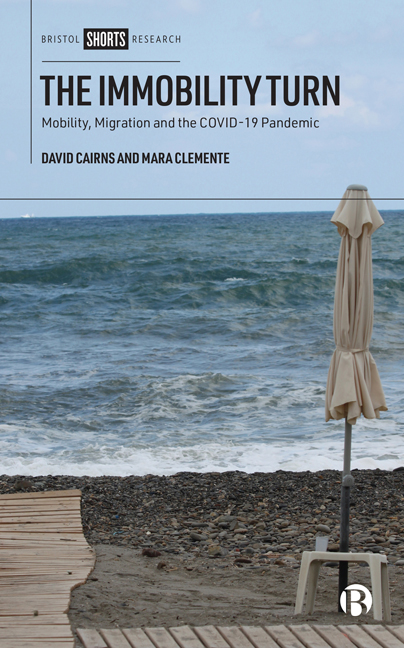Book contents
- Frontmatter
- Contents
- List of Figures
- About the Authors
- one COVID-19 and the Immobility Turn
- two Theorizing the Immobility Turn
- three From Overtourism to Undertourism, and Back Again
- four International Student Mobility and Immobility
- five Maintaining Migration during a Pandemic
- six Mobility after an Immobility Turn
- Notes
- References
- Index
six - Mobility after an Immobility Turn
Published online by Cambridge University Press: 18 January 2024
- Frontmatter
- Contents
- List of Figures
- About the Authors
- one COVID-19 and the Immobility Turn
- two Theorizing the Immobility Turn
- three From Overtourism to Undertourism, and Back Again
- four International Student Mobility and Immobility
- five Maintaining Migration during a Pandemic
- six Mobility after an Immobility Turn
- Notes
- References
- Index
Summary
In the final chapter of this book, we return to debates about the meaning of mobility and how this changed after the freedom to move was suspended for long periods during the first two years of the COVID-19 pandemic. This discussion acknowledges social, economic and political imperatives that possess the power to open and close mobility pathways and the pursuit of sustainability in regard to balancing the positive and negative impacts of expanded levels of international travel. While determining an optimal level of circulation has always been difficult, the pandemic further complicated this process, extending to a need to work out how to keep mobility profitable while maintaining public safety.
To make sense of this situation, we return to the conceptual ideas introduced in the preceding chapters. In Chapters 1 and 2, we looked at the mobility turn and the multiplication of mobilities that took place over the course of several decades, most intensively during the 1990s and the early years of the 21st century. This prolonged period of expansion led to maximized levels of human circulation in multiple forms, especially but not exclusively in international tourism. In these two chapters, we acknowledged not only the importance of prior theoretical developments on this theme but also what seems to have been a largely unheeded critique of expansionism, something that could not continue indefinitely due to sustainability concerns. We will never know how the mobility turn would have ultimately played out, since the pandemic meant expansionism never quite reached its apogee, but the diffusion of mobilities attained was still extremely impressive in quantitative terms, even if the quality of the experiences often left a lot to be desired.
As implied in Chapter 3, another problem that emerged during the period of expansionism was the unregulated and/ or mismanaged development of mobilities, resulting in multiple forms of extractivism taking place and removing the meaningfulness of much travel through saturating host communities with over-entitled – and often annoying – visitors, creating an intensified variant of the ‘tourist gaze’ (Urry and Larsen, 2011). The mobilities looked at in Chapters 4 and 5, meanwhile, appear to illustrate less problematic forms of expansionism, which were, nevertheless, not entirely benign due to concerns regarding social inclusivity in student mobility and problems with supporting labour migrants, particularly at times of heightened stress, like the lockdown periods during the pandemic.
- Type
- Chapter
- Information
- The Immobility TurnMobility, Migration and the COVID-19 Pandemic, pp. 96 - 108Publisher: Bristol University PressPrint publication year: 2023

